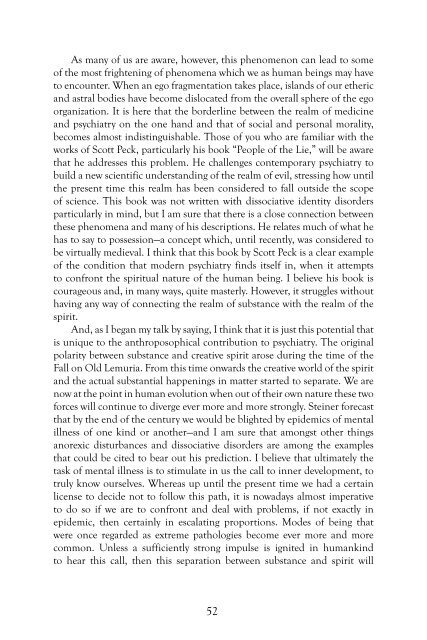When Healing Becomes Educating, Vol. 1 - Waldorf Research Institute
When Healing Becomes Educating, Vol. 1 - Waldorf Research Institute
When Healing Becomes Educating, Vol. 1 - Waldorf Research Institute
Create successful ePaper yourself
Turn your PDF publications into a flip-book with our unique Google optimized e-Paper software.
As many of us are aware, however, this phenomenon can lead to some<br />
of the most frightening of phenomena which we as human beings may have<br />
to encounter. <strong>When</strong> an ego fragmentation takes place, islands of our etheric<br />
and astral bodies have become dislocated from the overall sphere of the ego<br />
organization. It is here that the borderline between the realm of medicine<br />
and psychiatry on the one hand and that of social and personal morality,<br />
becomes almost indistinguishable. Those of you who are familiar with the<br />
works of Scott Peck, particularly his book “People of the Lie,” will be aware<br />
that he addresses this problem. He challenges contemporary psychiatry to<br />
build a new scientific understanding of the realm of evil, stressing how until<br />
the present time this realm has been considered to fall outside the scope<br />
of science. This book was not written with dissociative identity disorders<br />
particularly in mind, but I am sure that there is a close connection between<br />
these phenomena and many of his descriptions. He relates much of what he<br />
has to say to possession—a concept which, until recently, was considered to<br />
be virtually medieval. I think that this book by Scott Peck is a clear example<br />
of the condition that modern psychiatry finds itself in, when it attempts<br />
to confront the spiritual nature of the human being. I believe his book is<br />
courageous and, in many ways, quite masterly. However, it struggles with out<br />
having any way of connecting the realm of substance with the realm of the<br />
spirit.<br />
And, as I began my talk by saying, I think that it is just this potential that<br />
is unique to the anthroposophical contribution to psychiatry. The original<br />
polarity between substance and creative spirit arose during the time of the<br />
Fall on Old Lemuria. From this time onwards the creative world of the spirit<br />
and the actual substantial happenings in matter started to separate. We are<br />
now at the point in human evolution when out of their own nature these two<br />
forces will continue to diverge ever more and more strongly. Steiner forecast<br />
that by the end of the century we would be blighted by epidemics of mental<br />
illness of one kind or another—and I am sure that amongst other things<br />
anorexic disturbances and dissociative disorders are among the examples<br />
that could be cited to bear out his prediction. I believe that ultimately the<br />
task of mental illness is to stimulate in us the call to inner development, to<br />
truly know ourselves. Whereas up until the present time we had a certain<br />
license to decide not to follow this path, it is nowadays almost imperative<br />
to do so if we are to confront and deal with problems, if not exactly in<br />
epidemic, then certainly in escalating proportions. Modes of being that<br />
were once regarded as extreme pathologies become ever more and more<br />
common. Unless a sufficiently strong impulse is ignited in humankind<br />
to hear this call, then this separation between substance and spirit will<br />
52

















